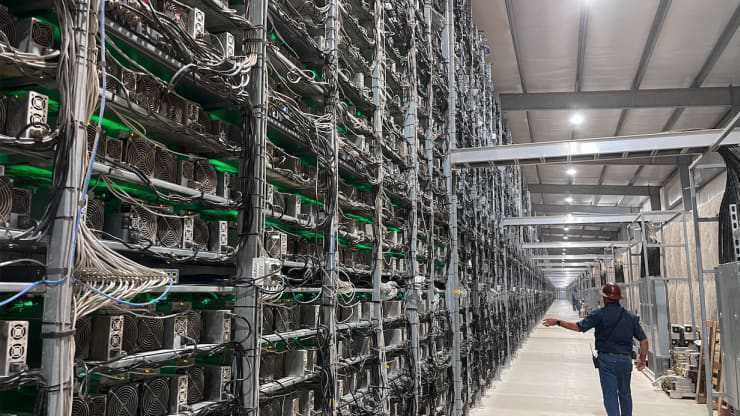Two of the biggest bitcoin mining companies in the world are battling it out in a Texas town of 5,600 people

In this rural Texas town of 5,600 people, two of the biggest names in bitcoin mining are battling it out for market share and cheap electricity.
These rivals also happen to be next-door neighbors.
Bitdeer – a firm spun off from Chinese bitcoin mining giant Bitmain – is four-tenths of a mile down the road from Riot Blockchain, one of the biggest publicly traded mining companies in America. Both are tenants of property once occupied by aluminum maker Alcoa, but they share little else in common.
Riot’s Whinstone mine is run by a team that thrives on transparency and throws open its doors to media on a daily basis, while Bitdeer is aloof, steeped in mystery, and definitely not keen on visitors.
“In this industry, everyone’s like, ‘Ooh, top secret, we have proprietary information!’ Well, actually, you don’t,” Whinstone CEO Chad Harris told CNBC.
“You take a cable, you plug it into a machine that somebody else built, you turn it on, you add a pool, and you mine bitcoin.”
Why Rockdale
Located an hour northeast of Austin, Rockdale looks like classic rural America. There are rolling hills, pastures of green grass, hay bales, a Walmart – which Mayor John King says is the main driver of sales tax, a key revenue stream for the city’s annual budget.
But to the more discerning eye, Rockdale offers all the fixings of a bitcoin miner’s dream home: Crypto-friendly politicians, large swaths of land, previously abandoned industrial infrastructure ripe for repurposing, and the ability to plug into Texas’ power grid.
The Electric Reliability Council of Texas, or ERCOT, is the non-profit organization that operates Texas’ grid. The grid is deregulated, meaning that customers can choose between providers.
Because miners at scale compete in a low-margin industry where energy is their main variable cost, they have reason to migrate to the world’s cheapest sources of power. The competition among power providers in Texas is a good thing for miners, since it typically translates to lower rates.
Rockdale was once home to the largest aluminum plant in the world, run by Alcoa. But starting in 2008, it began to shut down its operations, meaning that energy capacity was going to waste, due to the prohibitive cost of building the transmission capacity necessary to carry it to major population centers, according to Lee Bratcher, president of the Texas Blockchain Council.
The arrival of the crypto miners resolved that imbalance.
In addition, miners can be flexible in the face of fluctuating power supplies and prices. Unlike an aluminum smelter or just about any other business, miners can deal with an outage without suffering major financial damage.
This resilience is significant to a state that has recently struggled with the reliability of its power grid, which is separate from the rest of the country.
ERCOT sometimes asks consumers to conserve energy amid heat waves. The state also infamously suffered blackouts earlier this year after severe winter storms.
Mayor King says today’s arrangement between miners and ERCOT is pretty simple and mutually beneficial. Not only do miners make use of power otherwise going to waste, they also function as “interruptible load,” meaning they are able to turn off all of their machines with a few seconds’ notice when the grid is in a pinch and needs the extra power. Miners volunteer to do this because of financial incentives.
“Miners are committed to buying a certain amount of power and what they do is they sell it back at market [value] and make a profit,” explained King. “They have a contract of two cents or three cents...and they can sell it for $9 a kilowatt hour.”
“There were lots of things that went wrong,” Sen. Ted Cruz, R-Texas, said of the winter storm in early 2021 that devastated much of the state. “But I do think that bitcoin has the potential to address a lot of aspects of that.”
Cruz, whose views on bitcoin and the mining industry more widely, have proven prescient, recently weighed in on the topic at the Texas Blockchain Summit in Austin. During his main stage interview, Cruz pointed to the importance of the ability of bitcoin miners to turn on or off within seconds – a feature that is hugely beneficial during times when energy needs to be shifted back to the grid to meet demand.
“A lot of the discussion around bitcoin views bitcoin as a consumer of energy,” said Cruz. “The perspective I’m suggesting is very much the reverse, which is as a way to strengthen our energy infrastructure.”
Rockdale’s economic development director, James Gibson, says the town has 160 acres ready for the taking.
King has already fielded close to 40 inquiries from mining companies keen to set up shop there, many of whom are Chinese miners. Earlier this spring, Beijing cracked down on its domestic crypto mining industry. Exiled miners have since begun to seek refuge in places like the United States, which recently became the top mining destination on the planet.
“They have money. They have equipment. They just need a place – and power, quick,” said Gibson.